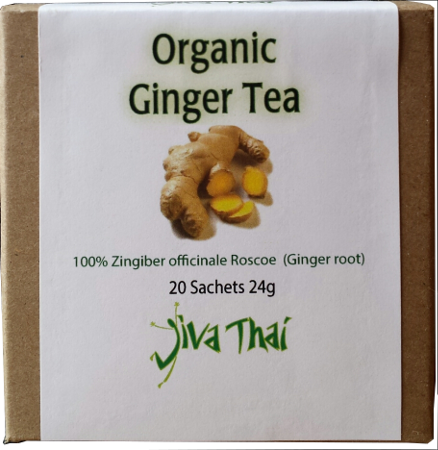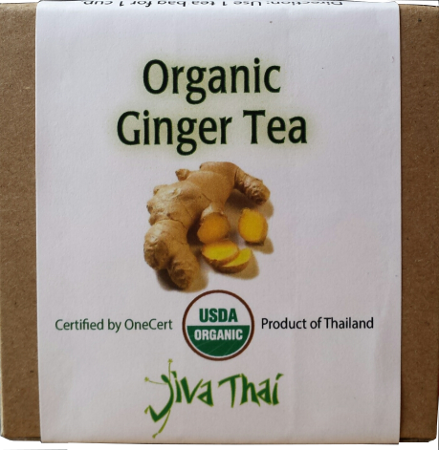 |
 |
Ginger Root (Zingiber officinale Roscoe) is used as a culinary herb and medicine. In traditional medicine, the whole plant can be used for treating various symptoms. For example, the root is used for nausea, increasing appetite, abdominal bloating, cough, mucus, digestion by increasing the release of bile, stomach ulcer, and hypertension. Ginger stalk is used as carminative medicine, for treating calcali, aiding digestion, ridding parasites, etc. Its flower is for refreshing, ridding parasites, digestion, treating calcali, watery eye, strangury, dysentery, etc. Also, the fruit is for lowering fewer.
Several scientific studies have confirmed its medicinal properties in dizziness, travel sickness, morning sickness in pregnancy, nausea from cancer treatment (especially in leukemiai). A study found that consuming 940g of ginger powder helped relieve nauseating in dizzinessii. Eighty volunteers who took 1g of ginger root per day experienced less seasickiii. Both ginger and vitamin B6 can help reduce nausea and vomiting in pregnant women. It is found that taking 1.05g of ginger per day is as effective as taking 75g/day of vitamin B6 in relieving nausea in early pregnancyiv. No side effect was found in 187 volunteered pregnant women and their babiesv. Studies also found that ginger (2g) help reduce nausea in women patient after gynaecological surgeryvi.
Many components in ginger that aids digestion and bloated and reduces bloated stomach are such as menthol, cineole, shogaol, acetone, gingerol, bomeol, fenchone, 6-gingerol, 10-ginerol, etc. Some of these components create propulsive movement and hence act as carminativeviiviii. Ginger and ulcer medicine that has ginger as a components (10-70%) are effective in treating stomach ulcer, reducing the release of acid or enzyme (pepsin). Therefore, they help relieve stomach painix.
In addition, several research studies confirmed the anti-inflammatory property of ginger root. There was an experiment on 28 arthritis patients, 18 osteoarthritis patients, and 10 people with muscular discomfort. After taking ginger powder in different doses from 3 months to 2.5 years, the result showed 75% of all arthritis and osteoarthritis patients had less pain and swollen, and all patients with muscular discomfort had no pain. This is due to the inhibitor effect of ginger in deriving prostaglandin and leukotrienex. Inflammation, pain, swollen and stiffness had reduced in arthritic patients who took ginger 5g/day for 3 monthsxi. Another research compared the effectiveness of ginger (at 30mg twice daily in extract form), ibuprofen (400mg trice daily) and placebo in 120 osteoarthritis patients for one month. The study found that both ginger and ibuprofen were equally effective in reducing inflammation, stiffness, pain and swollenxii.
iPace JC. Oral ingestion of encapsulated ginger and reported self-care actions for the relief of chemotherapy-associated nausea and vomiting. Dissertations Abstracts Int 1987;47:3297-B.
iiMowrey DB, Clayson DE. Motion sickness, ginger, and psychophysics. Lancet 1982:655-7.
iiiGrontved A, Brask T, Kambskard J, Hentzer E. Ginger root against seasickness: A controlled trial on the open sea. Acta Otolaryngol 1988;105:45-9.
ivSmith C, Crowther C, Willson K, et al. A randomized controlled trial of ginger to treat nausea and vomiting in pregnancy. Obstet Gynecol (Hagerstown, Md, United States) 2004;103(4):639-45.
vPortnoi G, Chng L-A, Karimi-Tabesh L, et al. Prospective comparative study of the safety and effectiveness of ginger for the treatment of nausea and vomiting in pregnancy. Am J Obstet Gynecol 2003;189(5):1374-7.
viVisalyputra S, Petcpaisit N, Somcharoen K, Choavaratana R. The efficacy of ginger root in the prevention of postoperative nausea and vomiting after outpatient gynecological laparoscopy. Anaesthesia 1998;53(5):506-10.
viiYamahara J, Huang Q, Li Y, Xu L, Fujimura H. Gastriointestinal motility-enhancing effect of ginger and its active constituents. Chem Pharm Bull 1990;38(2):430-1
viiiSuekawa M, Ishige A, Yuasak K, Sudo K, Aburada M, Hosoya E. Pharmacological studies on ginger I. Pharmacological actions of pungent constituents, 6-gingerol and 6-shogaol. J Phar macobio-Dyn 1984; 7(11):836-48.
ixCai J. Manufacture and application of soft capsule for treating stomach ache. Faming Zhuanli Shenqing Gongkai Shuomingshu Cn 1733291, 2006:20pp.
xSrivastava KC, Mustafa T. Ginger (Zingiber officinale) in rheumatism and musculoskeletal disorders. Med Hypoth 1992;39(4):342-8.
xiSrivastava KC, Mustafa T. Ginger (Zingiber officinale) and rheumatic disorders. Med Hypoth 1989;29(1):25-8.
xiiHaghighi M, Khalvat A, Toliat T, et al. Comparing the effects of ginger (Zingiber officinale) extract and ibuprofen on patients with osteoarthritis. Archives Of Iranian Medicine 2005;8(4):267-71.


